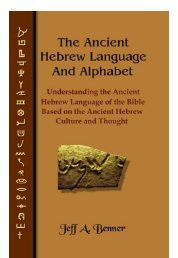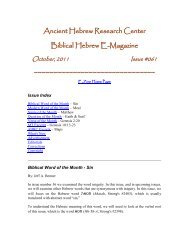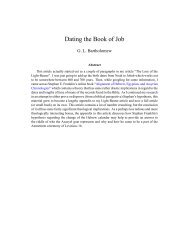My Name Forever - Ancient Hebrew Research Center
My Name Forever - Ancient Hebrew Research Center
My Name Forever - Ancient Hebrew Research Center
You also want an ePaper? Increase the reach of your titles
YUMPU automatically turns print PDFs into web optimized ePapers that Google loves.
<strong>My</strong> <strong>Name</strong> <strong>Forever</strong> 8<br />
vowels is due to the difference in the nature of the two letters. The Yud h, being a standard consonant, can<br />
take a Sh’va at the beginning of a word. The Aleph t, being in essence a mild guttural, cannot. It must<br />
take a compound Sh’va, (in this case a Hataph Patach) at the beginning of a word. The scribes simply<br />
transferred the nature of the short vowel under the Aleph t to the vowel under the Yud h rather than the<br />
exact vowel.<br />
22. The second vowel in Adonai hb«st is a Holam ( « ). In the case of Y’hvah vuvh it is missing. This is,<br />
I believe, to make doubly sure Adonai hb«st would be read, as Y’hvah vuvh is quite redundant and<br />
impossible to pronounce.<br />
Y’hvih vuvh and Y’hovih vu«vh<br />
23. Often times the words Adonai hb«st and vuvh appear side by side in the <strong>Hebrew</strong> text. When the<br />
scribes encountered this combination they inserted the vowels for the word Elohim oh v«kt (Elohim) into<br />
the Tetragram so that Adonai Elohim would be read instead of Adonai being read twice. Depending on the<br />
edition of the Tanakh, this looks like Adonai Y’hvih v uvh hb«st or Adonai Y’hovih v u«vh hb«st. Again, there<br />
is a discrepancy between the vowels under the Yud h of vuvh and the Aleph t of Adonai hb«st for the same<br />
reasons as stated above. The pronunciation Y’hvih v uvh is every bit as impossible as Y’hvah vuvh.<br />
24. It is worth noting that the edition of the Tanakh which uses Y’hvah vuvh also uses Y’hvih v uvh.<br />
The other edition uses Y’hovah vu«vh and Y’hovih v u«vh.<br />
25. All this has been said to help us see that the vowels under vuvh are not its real vowels. The<br />
following entry is from the popular four volume Even-Shoshan dictionary used in Israel. It verifies what<br />
has just been asserted.<br />
'oh v«kt" It `"vu«vh" IsUEb o t - "o Jst" It "o v" It "hb«st" t y cb /// vu«vh 'vu«vh<br />
:uh,IH ,It C o v , t ,Idvk rUX t v oU n '"v u«vh" IsUEb o t - "oh e«kt<br />
vu«vh 'vu«vh... pronounced “Adonai” or “HaShem” or “Adoshem” - when its vowels are<br />
“vu«vh”; or “Elohim, Elokim” - when its vowels are “v u«vh”, because of the prohibition of<br />
uttering the <strong>Name</strong> according to its letters. 28<br />
26. By the looks of the vowel points under the Tetragram in this entry, it appears that there must be at<br />
least a third edition of the Tanakh. The vowel under the initial Yud h, when the Tetragram is to be read as<br />
Elohim, is the short Hataph Segol ( ) which regularly stands under the Aleph t of Elohim oh v«kt. This<br />
combination in vuvh is ridiculous, as a Hataph Segol is never found under a Yud h in a legitimate word. It<br />
is under the Yud h in vuvh only to remind the reader to read, “Elohim,” and not, “Adonai.”<br />
27. It becomes evident that the vowels assigned to vuvh in the Scriptures are not the vowels which<br />
would allow one to speak it “according to its letters.” Y’hovah vu«vh and Y’hovih v u«vh are not, therefore,<br />
legitimate pronunciations. They are, in essence, linguistic bastards. They represent the vowels of the<br />
28 Avraham Even-Shoshan: HaMilon HeChadash (Kiryat Seifer, 1985), Vol. 2, p. 483.<br />
/483 /s 'hb J QrF '(1985 'r p x ,h r e)<br />
J s j v iIK N v :i JIJ-ic t o v r c t






